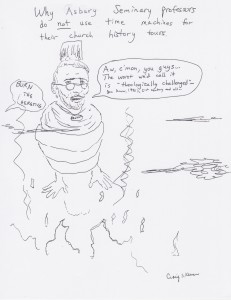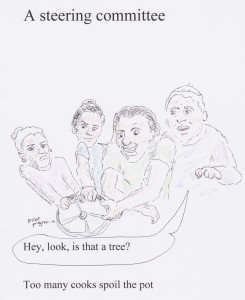Genesis lavishly depicts God’s goodness, but also warns of the consequences of choosing to reject that goodness. Genesis 1 emphasizes that God, the master artist, exquisitely designed what was good and beautiful, including diverse creatures that could reproduce and fill the world. In this narrative, it appears that God delights in such creativity. He also designs it practically and in complex, interwoven ways: he created some things for the benefiting of others within this larger system of nature (1:29-30).
Genesis highlights that what God did was “good.” With each phase of creation, God sees that what he has made is “good” (Gen 1:4, 10, 12, 18, 21, 25), but after he makes humans, the climax of his creation, he sees that it is “very good” (1:31). (In some circles someone might accuse me here of “species-ist bias” but this special role for human beings is really in the biblical text—☺.)
Genesis appeals to a different recounting of creation in ch. 2 to provide a different but theologically complementary picture of origins. Here the man is formed before trees and apparently even plants (2:5-9), at least in the man’s sphere of the world. But God provides trees that are pleasing to look at and “good” for food (2:9)—welcoming us to delight in creation’s beauty and tasty fruit. Genesis even mentions the goodness of gold from a region in 2:12.
Moreover, when God sees that something is “not good,” he remedies it. Seeing that it’s “not good” for the man to be alone, God provides him a suitable companion (2:18).
In this opening section of the Bible, God makes a good world and blesses us beyond measure. He delights in the people he has made like a parent might delight in their infant child.
Yet he gives one—just one—prohibition: people are not to eat from the tree of the knowledge of good and evil (2:17). The man and woman in this account already experience good from what God had created, but they have no way to distinguish it from anything else because they don’t yet know evil. (Thus nakedness, considered shameful in Israel’s culture, is not yet a problem, 2:25.) They will experience the difference between good and evil only once they know evil as well as good. God here warns them because he wants to protect them, just as we want to shield our infants from what is harmful to them. God of course knew the difference between good and evil himself, but in his case not by doing evil; by this point in the narrative even a previously uninformed reader can recognize from God’s works that he is purely good.
In Genesis 3 the serpent, however, challenges God’s motives (3:5), so that the woman recognizes that the tree is good for food and beautiful to look at (3:6). Keep in mind that in this respect the tree is no different from what we know about the garden’s other trees (2:9)—other trees from which they were allowed to eat. The key differences were that this tree’s fruit could also make one “wise” (3:6)—in knowing good and evil (3:5)—and that this one tree’s fruit was prohibited (2:17)! That the woman’s husband, who is with her, already knew that the penalty was death (2:17) and eats only after her (3:6) might suggest that he waited to see if the fruit would kill her before eating it! In any case, these mortals are now cut off from continual life. God would not let humanity live forever in that fallen state (3:22).
This narrative shows how the human propensity to mess up goes way back a long time; we still mess up today, and often for the same kinds of fundamental reasons, though now we already start with this huge deficit as our heritage. In striving to experience equality with God, however, the man and woman lost their role. (When people today ignore God, they seek to displace him with other things—things that will never truly fulfill us, because God created us for a greater, ultimately eternal, purpose in relationship with him.)
By mistrusting God’s goodness, we squander the precious gifts he has laid at our disposal. God had made humanity stewards of the earth, like a vizier subordinate only to him (1:26-28), higher than most gods appeared in ancient pagan pantheons. In 2:15, God put the man in the garden to “keep it” (NRSV and NASB; “take care of it,” NIV), a term that could also mean to “guard” it; but in 3:24 the same Hebrew term is applied to the cherubim stationed to guard the tree of life—to keep people away from it.
Consistent with the themes in Genesis, Paul traces humanity’s blindness to lack of gratitude (Rom 1:21). God has been good to us. We humans messed up his good world, but God still loves us (cf. Gen 3:21) and seeks to restore us. The text’s message spoke to ancient Israel and still speaks to us today. Ancient Israelite hearers of these accounts knew that God blessed them with a good land flowing with milk and honey; but if they disobeyed, God would expel them (Lev 18:28; 20:22) as he expelled transgressors from the garden in Genesis. However else we read Genesis 2—3, its theology invites us to recognize God’s goodness and eagerly turn to follow his way. Even in this world that we messed up, with all its troubles, signs of his goodness remain. Let’s recognize them and thank this one who loves us most.
(See also Creation as God’s lavish love.)




